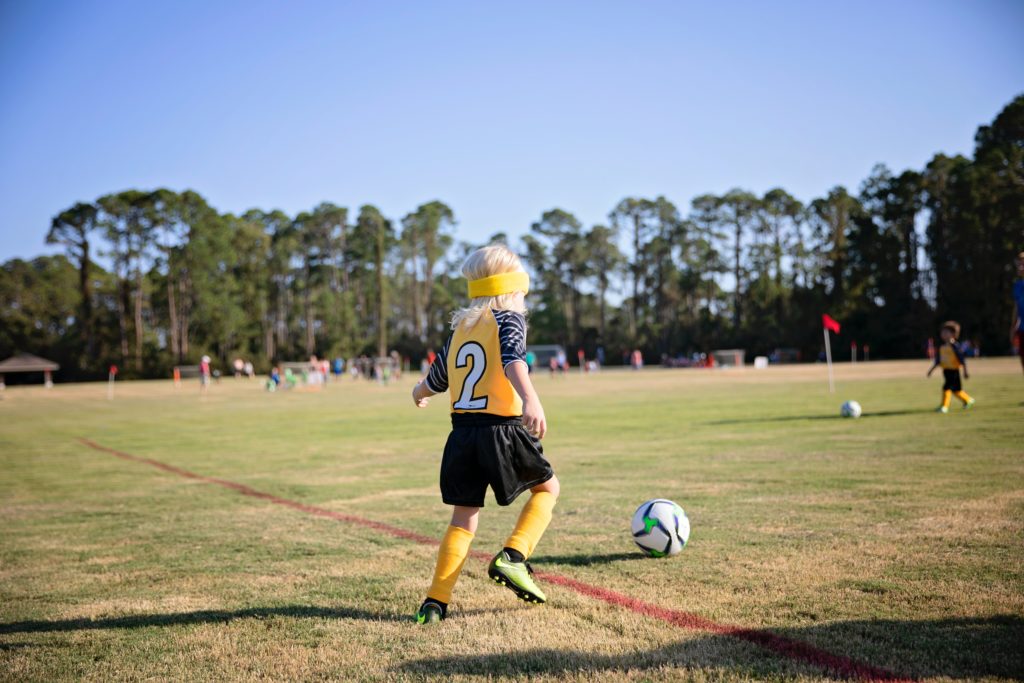
Roy Edwards will never forget one of the young players he coached on his son’s basketball team in Burke, Virginia. The child would resist going onto the court because of the pressure his parents put on him to play well. He was in first grade.
Rob Porter, another Burke dad, coached and refereed youth and college lacrosse for 12 years. He says he has seen and heard “everything under the sun” from parents on the sidelines — yelling and swearing (at coaches, refs, their kids and even other players), shouting instructions, following the play up and down the field and more.
“All of it affects the mood of the game, and almost always in a negative way,” Porter says.
Unfortunately, Edwards’ and Porter’s experiences are not unusual. Bad behavior from parents on the sidelines is as common as missed goals on the soccer field. But while young athletes can eventually brush off a dropped ball or a missed shot, pressure and unruliness from parents can leave lasting negative effects on kids — both on and off the field.
“Bad behavior by parents during a game can cause kids distress, embarrassment and the inability to make their own decisions,” says sports psychologist Christie Marshall, founder of Personal Best Sports in Ashburn, Virginia. “That can get into their heads and make them start to overthink, leading to more mistakes and less fun.”
It can also make kids lose interest in the sport.
“Researchers asked young athletes why they play sports, and the overwhelming response was, ‘Because it’s fun,’” Marshall says. “But a sobering statistic reveals that by age 13, 70% of athletes quit playing organized sports. The most cited response for why they quit? ‘It isn’t fun anymore.’”
So how can you be your child’s biggest fan without piling on the pressure? Here are some do’s and don’ts:
DO cheer for all the players, not just your own. Use positive encouragement such as, “Great job!” “Way to go!” and “Nice shot!”
DON’T berate your child — or anyone else’s. You may think you’re being helpful by shouting things like “Run faster!” “You need to make that catch!” and “Get your head in the game!” But all your child will hear is negativity and disapproval.
DO watch your body language. Your child is watching you as much as you’re watching her. So if you’re pacing the sidelines, shaking your head, waving your arms or laughing when she fumbles a play, she will notice. And remember, you are there to offer unconditional support and encouragement, not to make her feel bad.
DON’T scream at the officials. “Referees and umpires are authority figures, and our children should be encouraged to respect them and their opinions, even if they disagree. It is about having good sportsmanship,” says Marshall. “If you loudly express your disagreement, you undermine the integrity of the game and risk embarrassing your child.”
Remember, referees and umpires are humans who make mistakes. If they make a bad call, don’t take it personally. “They usually don’t have anything against a player or a team,” says Porter.
DO keep your cheering in check. It’s perfectly fine to get excited when your child makes a good play, but cheering excessively can embarrass him and annoy the other parents and players. Plus, he’ll catch on quickly if you clap like a maniac for every easy play, and it won’t mean as much to him.
DON’T yell out instructions. Ask any youth sports coach what parental behavior they find most annoying and they’ll likely say sideline coaching. Even if you’re an expert in the sport or your child is obviously doing something wrong, shouting instructions undermines the coach’s authority. It also puts your child in an awkward position if what you tell him to do differs from the coach’s instructions.
“During games, athletes are already processing information from their coaches, teammates and their own instincts,” says Dr. Caroline Silby, a sports psychologist in Potomac, Maryland. “I have never had an athlete tell me they needed more information to process.”
And micromanaging youth athletes robs them of the opportunity to learn some very important sports lessons, like making their own decisions, figuring out what does and does not work and bouncing back from mistakes.
“Parents need to let their children fail on their own and discuss it with them after the game as a learning tool,” says Edwards. “Trying to coach from the stands does more harm than good.”
If you really can’t resist giving instruction during games, talk to your child’s coach about helping out as an assistant — or consider become a coach yourself.
DO praise your child’s performance, regardless of outcome. We all want our children to succeed, but what’s most important is seeing them do their best.
“Children who believe their worth to Mom or Dad increases with every ribbon and trophy will most likely buckle under the weight of unrealistic expectations,” says Silby. “Communicate to your children that your love is based on who they are rather than what they accomplish. The pursuit of excellence is then transformed from a daunting task to a realistic goal.”
This story first appeared in our April 2021 issue.







